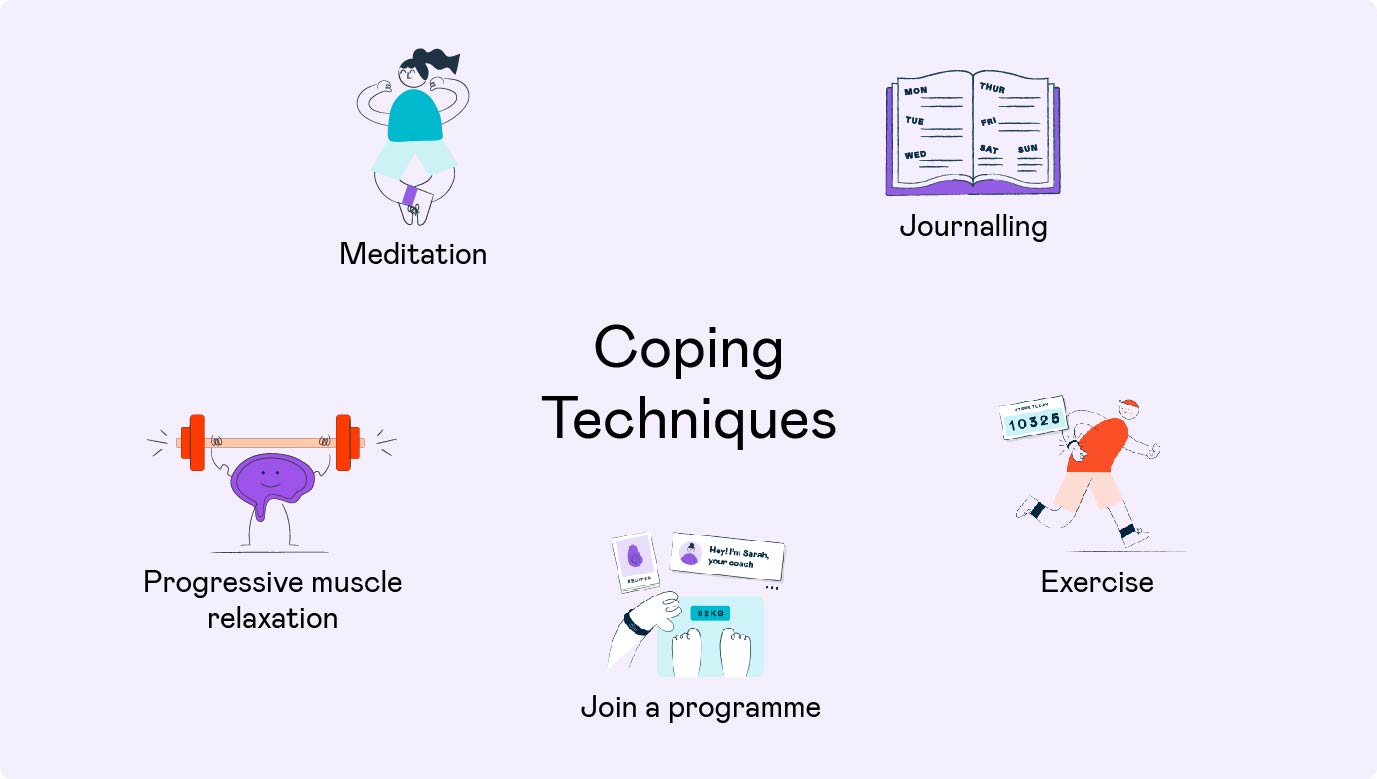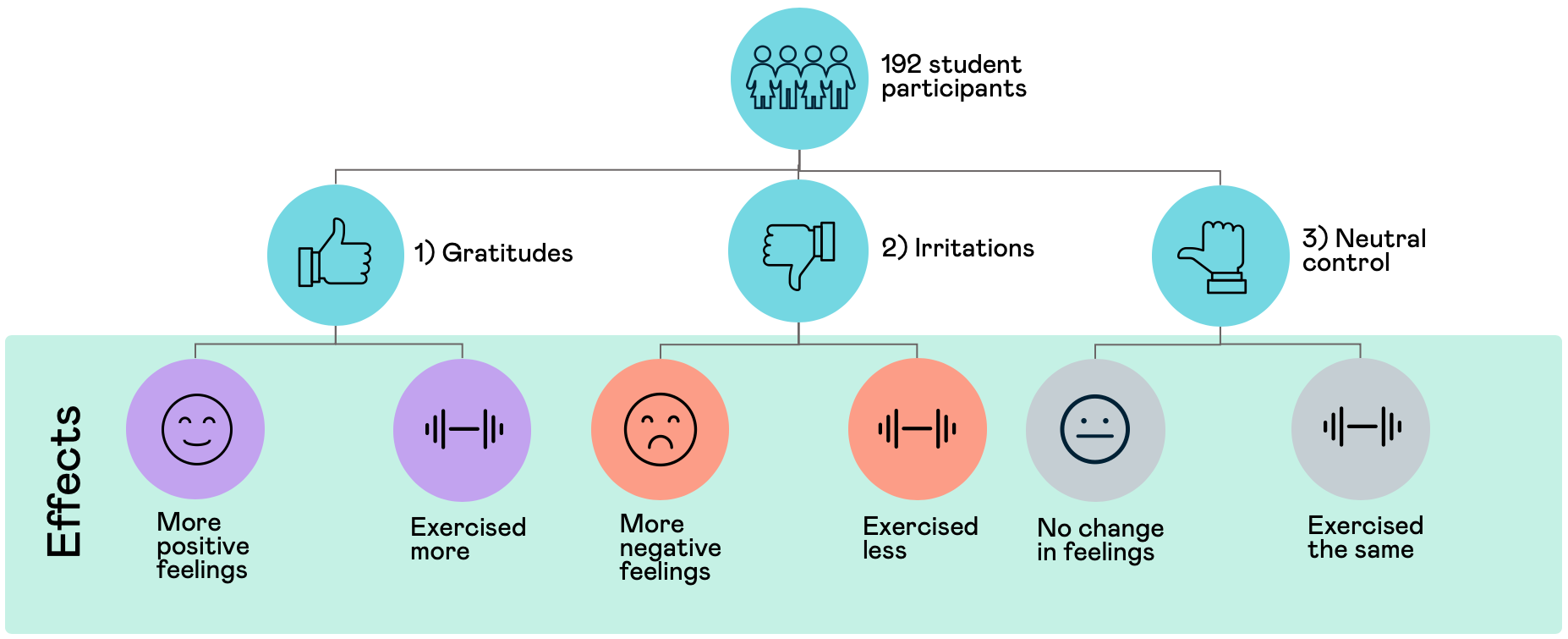Feelings of stress, anxiety, or depression can leave us feeling overwhelmed and helpless. Particularly when external situations that affect us are out of our control. Learning and practising coping strategies is an important way to protect our mental health and help us feel positive and calm.
It’s important to remember that what causes us to feel overwhelmed might not cause someone else to feel the same way. We’re all unique, and so certain coping techniques will work for some more than others.
A coping strategy can be treated like a habit. Here at Second Nature, we use behavioural science techniques to help people break bad habits and create healthy, new ones that last. Once we find something that works for us, we can continue practising it until it becomes an automatic response to feeling overwhelmed.
Besides self-care (like having a bath) and digitally detoxing (like having a break from social media), there are some specific coping skills that we can practise. This guide provides five different coping strategies that can help us feel calm and positive.
We suggest trying one at a time, for a week or so, and moving on to another if it doesn’t work. Trying them all at once might be overwhelming and simply add to our mental load!

Medication-assisted weight loss with a future focus
Start with Mounjaro, transition to habit-based health with our support

1) Meditation or deep breathing
The theory
People have practised meditation for thousands of years for spiritual, emotional, and physical wellbeing. It’s proven to be a highly effective coping strategy.
Brain scans taken on people during meditation have shown increased activity in regions of the brain directly correlated with decreased anxiety and depression. Meditation has been found to change specific brain regions that are involved in feelings of stress and depression such as the medial prefrontal cortex, amygdala, and hippocampus.
Like all habits, meditating takes patience and practise, but once we get used to regularly meditating, we learn to ignore the negative triggers of stress or anxiety.
The challenge
For those of us who’re new to meditation, a good way to learn is to start by doing 2 minutes of deep breathing each day, alone in a quiet room.
The best way to form a habit like this is to tie it to a ‘trigger’. For example, when we wake up, the first thing we do could be finding a quiet space to practise our breathing or meditation in. Here, the trigger is waking up.
Try practising breathing or meditation every morning when you wake up. For some extra support, there are a number of apps, such as ‘Calm’ and ‘Headspace’, or for free alternatives, ‘Simple Habit’ and ‘Smiling Mind’.
Key points:
- Meditation or deep breathing can actually alter brain areas linked to stress and depression.
- Consider downloading an app that helps us incorporate deep breathing or meditation into our daily life.
2) Journaling gratitudes
The theory
A common suggestion we hear is to write down our thoughts and feelings, but what many of us don’t know is that writing down our positive thoughts and feelings can be an extremely effective coping technique.
In one study, researchers separated 192 university students into three groups and asked them to complete a journal entry once a week for nine weeks.
Group 1) were instructed to write about things they were grateful for that happened throughout the week. Group 2) wrote about daily irritations or things that annoyed them. Group 3) was the neutral control group, and they were asked to write about events that happened to them that week, without any emphasis on these being positive or negative.

At the completion of the study, participants in group 1) were found to be more optimistic and felt better about their lives overall. Interestingly, they also reported fewer visits to the doctor and exercised more compared to those who journaled about irritations and negative experiences.
Reflecting on positive experiences can help us shift our attention away from negative emotions, such as stress or anxiety. This means we don’t dwell on a negative experience, but instead re-live a positive one. It’s not necessarily about ignoring negative moods or experiences, but rather about balancing these with positive ones when we’re struggling to cope.
A gratefulness journal can also be a powerful coping tool to look back over at times when negative thoughts or feelings take over.
The challenge
Find or buy an empty notepad and each day write one sentence starting with ‘I am grateful for…’. Like any habit, it’s helpful to anchor it to a ‘trigger’, so perhaps every night after we brush our teeth we write our one sentence.
The things we show gratitude for can be as small or big as we like! Some examples could be:
- ‘I am grateful for….the sun shining through my window today.’
- ‘I am grateful for….a funny phone call I had with my family member.’
- ‘I am grateful for….a really productive morning of work.’
- ‘I am grateful for….trying out a delicious new recipe for dinner.’
Key points:
- Journaling positive things that we’re grateful for can rewire our brain into focusing on positive thoughts and feelings, and help us re-balance.
- Aim to write down one ‘gratefulness’ sentence each evening for 1 week, and see how it affects your mood.
3) Progressive muscle relaxation
The theory
Progressive muscle relaxation (PMR) is a relaxation technique that has been studied in depth since the 1920s by scientists across the globe. Experts believe that PMR works as it helps to relieve muscle tension that comes about as a reaction to fear or anxiety. This can often result in muscle aches or pains, backaches, and tension headaches.
PMR has been shown to reduce stress-related activity in key areas of the brain, similar to the effects seen with common anxiety medication.
The American Academy of Sleep Medicine also concluded that PMR was one of only three non-pharmacologic treatments (i.e. not involving medication) for chronic insomnia that’s strongly supported by research studies.
The technique involves going through all the main muscles in your body and sequentially tensing and relaxing them.
The challenge
Just before we sleep tends to be a good time to practise PMR, as it helps us drift off. Each night this week, put in some headphones and listen to the recording we’ve made here at Second Nature.
It takes 6 minutes, and guides us through the process of PMR, step by step. Consider how your mind and body are feeling once you’ve finished – if you’re still awake!
Key points:
- PMR is a coping mechanism that can play a part in stress management and improve our quality of sleep by relieving muscle tension.
- The best way to start practicing PMR is to try the Second Nature recording before bedtime.
4) Exercise
The theory
As well as benefitting our physical health, exercise of any kind releases dopamine, the ‘happy’ hormone, which leaves us feeling better. Interestingly, evidence suggests that exercise might also help us cope with emotions in the longer term by positively impacting our brain.
The hippocampus is the part of our brain that is responsible for stress control. Studies have demonstrated that chronic stress can shrink the size of our hippocampus, and inhibit electric signalling. This means that our ability to absorb and process new information will be hindered and our capacity to deal with stress will decrease. This has a further knock-on effect, which is even more stress!
Regular exercise has been shown to increase the size and activity of the hippocampus. One study measured the impact of three bouts of moderate-intensity exercise a week over the course of a year, against a control group of stretching exercises only. The results showed that the participants in the exercise group displayed an increase of over 2% in the volume of the hippocampus, compared to the stretching group which showed a 1.4% decline during the same period!
This suggests that if we exercise regularly, we’ll be able to cope better during stressful situations.
The challenge
If we’re new to exercise, it’s important to understand and accept that changes won’t happen overnight, exercise should be gradually integrated into your lifestyle. A good challenge would be to try a different form of exercise each week until you find one you enjoy. If we enjoy the exercise and focus on the benefits to our mental wellbeing, we’ll find ourselves intrinsically motivated to continue.
That could be going for a brisk walk, doing yoga in our homes, or even a faster pace workout in our gardens.
For those of us who’ve had practise doing an exercise we enjoy, we can try to set ourselves the task of setting an alarm each day at the same time where we pause what we’re doing and do that exercise for 10 minutes.
Once we’ve got into the habit of doing a small bit of exercise each day we can increase the amount of time to 15 minutes, then 20 minutes, and so on.
Key points:
- Exercise can help us cope in the short-term, by increasing the secretion of the ‘happy’ hormone, and long-term, by increasing the size of our brain region responsible for emotion.
- We should find an exercise we enjoy and slowly incorporate it into our daily routine.
5) Join a programme
The theory
Evidence suggests that communicating with a mentor is one of the most powerful tools to help us cope and change our behaviours. It provides accountability and support to keep us balanced.
Research also suggests that we mirror the behaviour of other people who we engage with. This suggests that if we join a programme with like-minded individuals, we can encourage each other to practise healthy habits that help us cope with the stresses of everyday life. For those of us who’re struggling to cope, joining a programme to gain that extra support can be extremely beneficial.
The challenge
If we feel like we could use extra support in helping us cope and build healthy habits, we could consider joining a programme. Digital programmes offer the convenience of being able to engage with it from our homes, rather than travelling to a meeting or group.
Second Nature is a completely digital habit change programme that gives you daily, online support from a health coach. All of our health coaches are registered nutritionists or dietitians. The 12-week course takes place entirely within the app with no need for in-person meetups.
When you sign up to the programme, you’re provided with a peer support group, made up of other people who’re starting their habit change journey at the same time as you. Many people find the combination of advice from their health coach and social support from their peer group extremely motivating.
We’ve taken learnings from behavioural science and mirrored these in our educational content and coaching style. The Second Nature programme makes it easy for us to form new habits, ones that help you sleep better, eat better, and feel better.
Key points:
- Habit change programmes can help us build coping strategies to use when we need them, and provide us with extra support and social interaction.
- Second Nature is a completely digital habit change programme that gives you daily, online support from a health coach.


